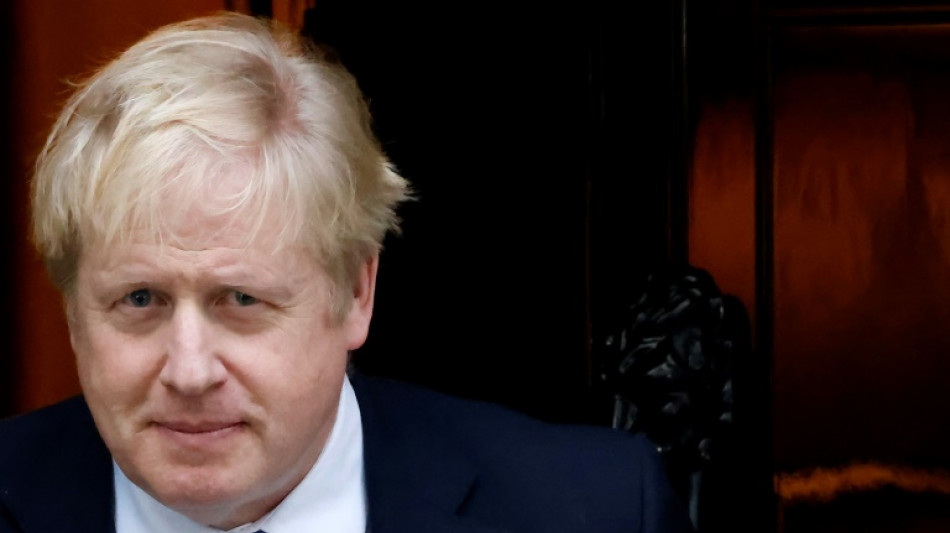

UK PM sorry for 'partygate' but vows to plough on
British Prime Minister Boris Johnson on Monday apologised after his government was criticised for "failures of leadership and judgment" in allowing lockdown-breaching parties at his offices.
Johnson's position has been hanging by a thread because of the steady drip of revelations since late last year, but he has in the last week been given a lifeline as police stepped in.
"I'm sorry for the things that we simply didn't get right and also sorry for the way this matter has been handled," Johnson told MPs in parliament.
He vowed "to get on with the job" despite widespread political and public anger and calls for him to quit or be forced out.
"I get it and I will fix it," he added, promising sweeping changes to his Downing Street operation following criticism about lack of accountability and managerial oversight.
The police probe meant that senior civil servant Sue Gray was forced to avoid going into detail in a long-awaited report about 16 events held in 2020 and last year, so as not to prejudice the Scotland Yard inquiry.
But Gray still managed a stinging rebuke to the prime minister's authority, contrasting government officials' behaviour with the sacrifices made by the public during the pandemic.
"Too little thought" had been given about how appropriate boozy events were and would be seen as others stuck to the rules, unable to comfort loved ones sick and dying with Covid.
"There were failures of leadership and judgment by different parts of No 10 (Downing Street) and the Cabinet Office at different times," Gray wrote in her 12-page report.
"Some of the events should not have been allowed to take place. Other events should not have been allowed to develop as they did."
Gray questioned more than 70 individuals and examined emails, WhatsApp and text messages, photos and Downing Street's entry and exit logs.
She condemned "excessive" drinking in Downing Street, as well as unwieldy expansion of the prime minister's office in recent years that had blurred lines of accountability.
- 'Man without shame' -
Johnson's opponents have accused him of misleading parliament by insisting the events at Downing Street were within the rules at the time and were work-related.
Ministers found to have misled MPs are normally expected to resign.
In angry exchanges in the House of Commons, Johnson urged all sides to await the Metropolitan Police's own findings.
But opposition Labour leader Keir Starmer said the fact that 12 of the 16 parties, including one in Johnson's own flat, were subject to a police probe was "a mark of shame".
"He is a man without shame," the former chief prosecutor said, urging Johnson's Conservative cabinet allies to depose him instead of "supporting further misconduct, cover-up and deceit".
Weeks of revelations in the British media since December have seen leaked photographs and emails indicating repeated breaches of social distancing rules the government set for the country.
They include a cocktail party in May 2020 in the Downing Street garden, as well as Christmas celebrations, and also a drink-fuelled get-together before Prince Philip's funeral in April.
Details of that event, at which staff reportedly brought a suitcase filled with alcohol and danced until the small hours, caused outrage given the socially distanced memorial.
An enduring image of the funeral was Queen Elizabeth II, sat alone in the chapel at Windsor Castle, mourning her husband of 73 years.
Downing Street later apologised to the monarch.
- Breathing space -
The revelations have posed the greatest threat to Johnson's position since he became prime minister in 2019 on a wave of support for his populist Brexit agenda.
A handful of his own Conservative party MPs are on record as saying they had no confidence in his leadership. More have been expected to join them.
Fifty-four Tory MPs are required to force a no-confidence vote but many have been keeping their counsel until the Gray report comes out.
Former international development secretary Andrew Mitchell joined the Conservative rebels, telling Johnson in parliament he no longer had his support.
In recent days he has talked tough against Russia in the simmering tensions with Ukraine, and is keen to push on with his post-Brexit agenda.
I.Frank--MP




